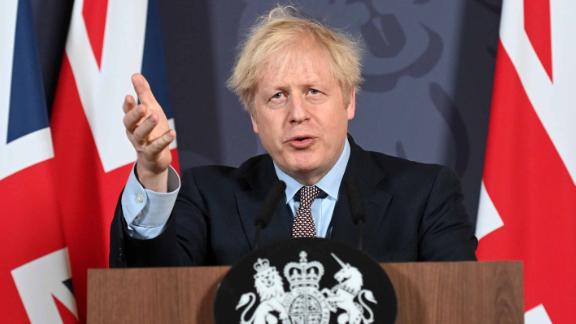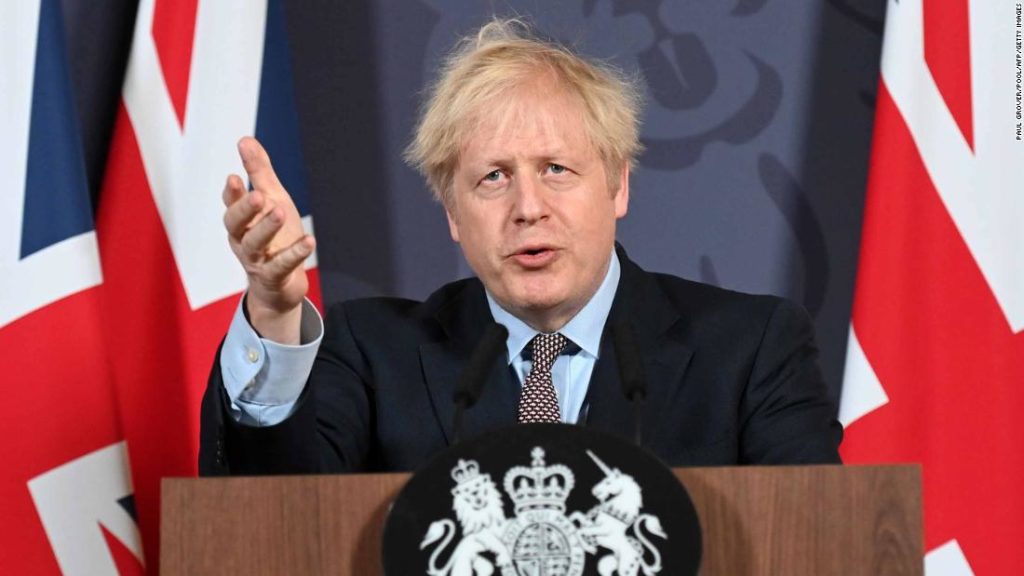London
CNN Business
—
Just seven months after singing its praises, British Prime Minister Boris Johnson is attempting to rewrite the Brexit deal he signed with the European Union.
It’s a risky move that will undermine Britain’s credibility as a trustworthy trading partner at the very moment that the UK government is seeking to forge economic alliances far beyond Europe to justify its “global Britain” sales pitch for Brexit, according to experts.
EU officials have already rejected the UK call for a renegotiation, which trade experts say amounts to a brazen attempt to press the European Union to agree to demands that it already rejected during several rounds of talks.
Other countries watching the drama unfold will proceed with caution when it comes to dealing with the United Kingdom, according to L. Alan Winters of the UK Trade Policy Observatory at the University of Sussex in England.
“It certainly does raise questions about the trustworthiness of this government,” he told CNN Business. “I don’t think it will lead to the complete cessation of negotiations between the UK and other countries, but I think it will make it a little bit more difficult,” he added.
To be clear, the UK government’s capricious behavior is a bad look, but it won’t necessarily prove fatal to future trade alliances. It could, however, weaken its negotiating position.
“The UK is a substantial economy,” and is an “attractive trade partner in many ways,” said Simon Usherwood, a professor of politics and international studies at The Open University in England.
Potential partners, such as New Zealand and other Pacific nations, may just insist on more robust ways to settle disputes in case the United Kingdom tried to backtrack on a deal, he told CNN Business.
“If you wanted a trade deal with the UK, now is probably the best time to get one on your own terms,” Usherwood added, pointing to the highly accommodating deal the UK government granted Australia. “The UK is in a tight situation. It needs to show that leaving the EU was a worthwhile venture.”
For now at least, the UK government’s approach will further strain relations with the European Union, still the country’s biggest trading partner by a long way.
At the heart of the issue is the Northern Ireland Protocol, which was included in the Brexit deal to avoid the return of a physical border between Northern Ireland, which is part of the United Kingdom, and Ireland, which is a member of the European Union.
Border checks and guard posts disappeared following the 1998 Good Friday Agreement that brought peace to the island of Ireland after 30 years of violent conflict between Catholic nationalists, who want a unified country, and Protestants who are loyal to the United Kingdom.
The European Union worried that a physical barrier could once again become a source of tension, and it would not agree to police the border between Ireland and Northern Ireland to protect the integrity of the EU market. Johnson, who helped lead the campaign for Brexit, instead agreed that Northern Ireland would remain subject to EU market rules, and to check goods flowing from the United Kingdom to Northern Ireland.
But those new checks on goods moving between mainland Britain and Northern Ireland have created chaos, upending supply chains, adding costs to businesses and reducing the availability of certain products in Northern Ireland supermarkets. According to the UK government, at least 200 businesses in Britain have stopped servicing the nation due to post-Brexit red tape.
On Thursday, the British Generic Manufacturers Association, a trade body for manufacturers of generic medicines, said onerous new trading rules have forced its companies to put on notice over 2,000 medicines for withdrawal from Northern Ireland.
The UK government now wants “significant change” to the Protocol, which it acknowledges in a paper published this week is the cause of “most of the current friction” with the European Union. It is effectively trying to renegotiate a deal it agreed to seven months ago, putting forward proposals that it knows the European Union cannot accept.
The paper “reads like a client’s submission to their divorce lawyer — full of blame-shifting, faux sadness and passive aggression,” Winters and Michael Gasiorek of the UK Trade Policy Observatory wrote in a blog on Thursday.
“It reflects weakness and can only serve to diminish the Government’s international standing,” they added.
The United Kingdom has a lot at stake. Brexit has added costs to British exporters, knocking trade with their most important market and hurting economic growth in the long run. It needs new trade deals to offset some of the damage caused by Brexit.
But if it fails to honor treaties it has already signed, the UK government might find it more difficult to secure agreements on favorable terms with other countries, including the United States.

PAUL GROVER/POOL/AFP/Getty Images
Britain’s Prime Minister Boris Johnson announcing his Brexit deal on December 24, 2020 just days before a self-imposed deadline.
“We will not agree to a renegotiation of the Protocol,” European Commission Vice President Maroš Šefčovič said in a statement on Wednesday. “Respecting international legal obligations is of paramount importance,” he added.
This sentiment is shared by Jacinda Ardern, the prime minister of New Zealand — a country with which Britain is currently engaged in trade talks and which has the power to prevent it from joining the Comprehensive and Progressive Agreement for Trans-Pacific Partnership (CPTPP).
The CPTPP is an 11-country free trade pact that includes Mexico, Australia, Canada and Singapore. While it won’t compensate for the economic losses arising from Brexit, it has nonetheless been described by UK Trade Secretary Liz Truss as a “glittering post-Brexit prize.”
In a speech to the New Zealand Institute of International Affairs earlier this month, Ardern said that New Zealand had agreed to negotiations that will pave the way for the United Kingdom to join the partnership.
“CPTPP is our highest quality agreement,” she added. “Those aspiring to join will have to be able to meet its high standards.”
Some trade experts interpreted the comment as being directed at Britain. “If it wasn’t intended for the UK it was a completely wasted breath,” Winters told CNN Business.
Even more pointed warnings have come from other quarters. For any UK government, a trade deal with the United States would be by far the biggest economic victory of a post-Brexit Britain.
That has always looked a long shot, given that neither former President Donald Trump nor current President Joe Biden have had much appetite to sign up to major international treaties, amid a broader shift away from trade liberalization.
But the UK government’s recent actions aren’t helping its cause. In a statement this week, US Democratic Congressman Brendan Boyle rebuked the UK government’s approach to Northern Ireland and highlighted “strong bipartisan” support for the Good Friday Agreement.
“The British government negotiated the Northern Ireland Protocol, agreed to it, and its Parliament voted for it. Yet almost immediately after it went into effect, the British government has tried to evade its responsibilities under the protocol,” he said.
“Their latest statement and proposed changes just continues this trend and serves only to further destabilize Northern Ireland,” he added.
While Biden has been clear that his focus lies mainly on domestic issues, he has also repeatedly warned Britain against making the Good Friday Agreement a “casualty of Brexit.”
“Biden has a specific interest in Northern Ireland and its stability, and does view the UK as the antagonist in that discussion,” said Sam Lowe, a senior research fellow at the Centre for European Reform.
“Ongoing disputes with the EU over Northern Ireland and threats to renege on commitments creates a problem with the US, but I’m not convinced it creates huge problems with any other countries,” he added.
David Henig, UK director at the European Centre for International Political Economy, said that other countries may view the spat over Northern Ireland as a unique case.
“Other countries will certainly be aware that the UK is going back on [its agreements with the European Union], but each negotiation is separate,” Henig said. “It will not be viewed as a particularly good thing but I’m not sure that they won’t segregate it away from their own discussions. Northern Ireland clearly is a special case.”
With grace periods on checks on some goods flowing between Britain and Northern Ireland set to expire at the end of September, including animal products such as chilled meats, more political wrangling between the United Kingdom and European Union lies ahead.
“I can quite easily see this carrying on for quite a while without a change,” said Henig.
“The state of uncertainty might become the status quo,” added Lowe.
Northern Ireland will bear the brunt of this sorry state of affairs. But Johnson’s dream of a “global Britain” will also suffer consequences.
You may also like
-
Afghanistan: Civilian casualties hit record high amid US withdrawal, UN says
-
How Taiwan is trying to defend against a cyber ‘World War III’
-
Pandemic travel news this week: Quarantine escapes and airplane disguises
-
Black fungus: A second crisis is killing survivors of India’s worst Covid wave
-
Tesla’s earnings report: Here are 8 things investors will be looking for

